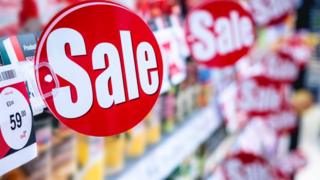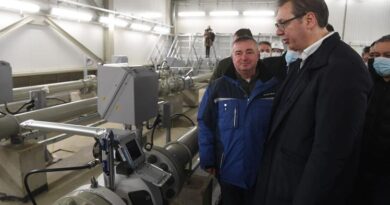Coronavirus: Special offers ‘pulled from shelves during lockdown’
 Image copyright Getty Images
Image copyright Getty Images Toilet roll was not the only thing to disappear from supermarket shelves at the start of lockdown. Buy-one-get-one-free deals were pulled too.
There was a 15% fall in the frequency of promotions during the first month of lockdown, research by the Institute for Fiscal Studies has found.
This, in part, led to a 2.4% rise in the price of groceries in one month.
Researchers said this was the equivalent of price increases expected for a whole year.
There was also an 8% fall in the variety of grocery products on the shelves during lockdown, according to the research funded by the Nuffield Foundation, which campaigns on social policy.
«This, independently of price rises, will have a negative impact on consumers,» the authors of the report said.
‘Panic’ buying
Shoppers bulk bought various essentials just prior to, and at the start of, lockdown.
It prompted a number of retailers to put limits on the number of items being bought, ranging from individual products such as toilet roll and pasta to the entire basket of items available via supermarket websites.
The IFS research tracked price data of groceries such as food, drink, toiletries, cleaning products and pet food.
It found prices were 2.4% higher in the first month of lockdown, a rate more than 10 times higher than in preceding months and unprecedented in recent years.
Since then, prices had fallen slightly, but they still remained more than 2% higher than before lockdown, the report said.
«There was more grocery inflation in one month than we often see in a year,» said Martin O’Connell, co-author of the report.
«Higher prices and reduced variety have persisted in the following weeks. At a time when many households are subject to reductions in their income, higher prices for food, drinks and household goods will further feed into squeezed household budgets.»
Half of this increase was the result of fewer promotions, such as buy-one-get-one-free deals and money off discounts. The IFS said was not recorded in official inflation figures, to be updated next week.
The fall in promotions was different to during last recession, when consumers bought more goods that were on sale as their own finances were squeezed.
This time, almost all households saw their grocery bills increase.
The researchers also said that investors would have expected the coronavirus crisis to lead to prices falling, rather than rising.
«At a time when financial markets expect the Covid-19 pandemic to be a disinflationary shock, this increase in the price of groceries, which was experienced by almost all households and in almost all product categories, suggests policymakers nonetheless should remain vigilant about the prospect of higher inflation, at least for some goods and services,» said co-author Xavier Jaravel.


